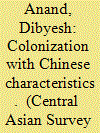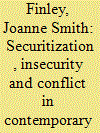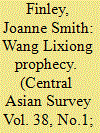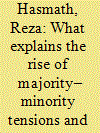|
|
|
Sort Order |
|
|
|
Items / Page
|
|
|
|
|
|
|
| Srl | Item |
| 1 |
ID:
164495


|
|
|
|
|
| Summary/Abstract |
China as a victim rather than a proponent of modern colonialism is an essential myth that animates Chinese nationalism. The Chinese statist project of occupying, minoritizing and securitizing different ethno-national peoples of Central Asia, such as Uyghurs and Tibetans, with their own claims to homelands, is a colonial project. Focusing on China’s securitized and militarized rule in Xinjiang and Tibet, the article will argue that the most appropriate lens through which this can be understood is neither nation-building nor internal colonialism but modern colonialism. It argues that the representation of Uyghurs and Tibetans as sources of insecurity not only legitimizes state violence as a securitizing practice but also serves contemporary Chinese colonial goals.
|
|
|
|
|
|
|
|
|
|
|
|
|
|
|
|
| 2 |
ID:
164492


|
|
|
|
|
| Summary/Abstract |
The official Chinese view of the Uyghur Islamic revival is overwhelmingly dominant. Because of the extraordinary measures taken to shield from international view the actual developments in the region and to silence Uyghur voices, we lack a clear sense of what it is to be a Muslim in contemporary Xinjiang. This article explores debates within Uyghur society about faith, politics and identity as they are revealed through the social media platform WeChat. It aims to disrupt the dominant narratives and enable new understandings of the changing patterns of religiosity and violence in the region. It focuses on the use of social media to access affective experiences of religion, projects of self-fashioning, and the new geographies of knowledge and experience formed as Uyghurs turned to the readily available scripts circulating in the wider Islamic world and adapted them to a very local sense of crisis.
|
|
|
|
|
|
|
|
|
|
|
|
|
|
|
|
| 3 |
ID:
164490


|
|
|
|
|
| Summary/Abstract |
China has declared a war on terrorism in Xinjiang, identifying violence in the region as a top security threat. However, what nowadays is officially constructed as ‘terrorism’ was framed as ‘counter-revolution’ in the past. Informed by the concept of macrosecuritization and the agenda of critical terrorism studies, this article examines the changing nature of Chinese state framing of violence in Xinjiang. Through a comparative analysis of the discursive construction of the Baren (1990) and Maralbeshi (2013) violent incidents, I find that the terror lexicon has replaced old narratives of counter-revolution to legitimize a sustained crackdown under a novel geopolitical context. The construction of violence in Xinjiang as terrorism, I argue, is contingent, limited and unstable. It marginalizes factors other than an extremist or separatist agency in the incubation of the violence, in particular the frictions created by the crackdown with which the Chinese government is trying to placate the unrest.
|
|
|
|
|
|
|
|
|
|
|
|
|
|
|
|
| 4 |
ID:
164489


|
|
|
|
|
| Summary/Abstract |
In the Introduction to this special issue, I first provide an overview of the programme of 'de-extremification' and mass internment in Xinjiang since early 2017. I then situate this development against the ‘ideological turn’ in Chinese Communist Party policy under President Xi Jinping, highlighting the new emphasis on stability maintenance and ideational governance. Next, I explore experiences of (in)security in Uyghur communities in- and outside of Xinjiang in the era of internment to consider how far PRC counter-terrorism initiatives have now evolved into state terror. In doing so, I apply Ruth Blakeley's (2012) definition of state terror as a deliberate act of violence against civilians, or threat of violence where a climate of fear is already established by earlier acts of violence; as perpetrated by actors on behalf of or in conjunction with the state; as intended to induce extreme fear in target observers who identify with the victim; and as forcing the target audience to consider changing its behaviour. Finally, I discuss the six contributions to the special issue.
|
|
|
|
|
|
|
|
|
|
|
|
|
|
|
|
| 5 |
ID:
164494


|
|
|
|
|
| Summary/Abstract |
Since spring 2017, the Xinjiang Uyghur Autonomous Region in China has witnessed the emergence of an unprecedented re-education campaign. According to media and informant reports, untold thousands of Uyghurs and other Muslims have been and are being detained in clandestine political re-education facilities, with major implications for society, local economies and ethnic relations. Considering that the Chinese state is currently denying the very existence of these facilities, this paper investigates publicly available evidence from official sources, including government websites, media reports and other Chinese internet sources. First, it briefly charts the history and present context of political re-education. Second, it looks at the recent evolution of re-education in Xinjiang in the context of ‘de-extremification’ work. Finally, it evaluates detailed empirical evidence pertaining to the present re-education drive. With Xinjiang as the ‘core hub’ of the Belt and Road Initiative, Beijing appears determined to pursue a definitive solution to the Uyghur question.
|
|
|
|
|
|
|
|
|
|
|
|
|
|
|
|
| 6 |
ID:
164493


|
|
|
|
|
| Summary/Abstract |
In Your Western Regions, My Turkestan (2007), Chinese dissident Wang Lixiong warned of the ‘Palestinization’ of the Xinjiang question, defined as reaching ‘a critical point in time’ where Uyghurs and Han Chinese enter an interminable ‘ethnic war’. Following the knife attack on Han civilians in Kunming (2014), seen by many as an act of Uyghur terror, Wang reminded us that he had foreseen this trajectory seven years earlier. This article outlines Wang’s six interpretations of ‘Palestinization’ in the Xinjiang context, then shows how tightened regulations on religion and intrusive religious policing was the main catalyst for local retaliatory violence in 2012–2015. I contend that state securitization of religion was counterproductive, heightening societal insecurity and promoting inter-ethnic conflict between Uyghur and Han communities. In Chen Quanguo’s era of ‘de-extremification’, the state’s purported attempt to ‘purify’ Islamic practice continues to be experienced on the ground as violation of pure, halal space.
|
|
|
|
|
|
|
|
|
|
|
|
|
|
|
|
| 7 |
ID:
164491


|
|
|
|
|
| Summary/Abstract |
In the past few years there has been a rise of inter-ethnic violence in China. While ethno-cultural repression and ineffective state policies are correctly attributed as key culprits behind this reality, this article suggests that socio-economic factors play a fundamental contributory role as well. Using the Xinjiang case, the article maps ethnic tensions and violence as a manifestation and expression of a growing and heightened ethno-cultural consciousness stemming from ethnic minorities’ low socio-economic status due, in part, to internal Han migration, and a labour market process – involving agency and structure – that has shaped a split and segmented labour market.
|
|
|
|
|
|
|
|
|
|
|
|
|
|
|
|
|
|
|
|
|